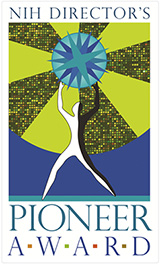2009 Awardees
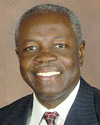
Ivor J. Benjamin, M.D.
University of Utah School of Medicine
Project Title: Protein Misfolding Diseases and Oxido-Reductive Pathways
Grant ID: DP1-OD006438
Ivor J. Benjamin, M.D., is a professor of medicine and biochemistry at the University of Utah School of Medicine. He received an M.D. in 1982 from the Johns Hopkins University School of Medicine. Benjamin is a physician-scientist who uses the mouse and housefly as model systems to determine how reductive—as opposed to oxidative—stress alters protein conformation and contributes to the development of protein aggregation diseases like Alzheimer’s and Parkinson’s. He is using his Pioneer Award to determine the molecular switches that give rise to excess reducing conditions leading to protein aggregation in human cardiovascular and neurological disorders. Benjamin’s ultimate goal is to fundamentally reshape the current dogma that focuses on the role of oxidative stress and antioxidants in these conditions.
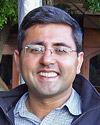
Ajay Chawla, M.D., Ph.D.
Stanford University
Project Title: Immune Triggers of Tissue Regeneration
Grant ID: DP1-OD006415
Ajay Chawla, M.D., Ph.D., is an assistant professor of medicine at Stanford University. He received an M.D. and a Ph.D. in physiology from the University of Pennsylvania in 1996. Chawla’s laboratory combines molecular and genetic approaches to understand how the immune system controls metabolic and cellular homeostasis. He is using his Pioneer Award to define the signals and mechanisms by which the immune system orchestrates tissue regeneration after injury, with the goal of modulating these pathways to provide new methods forrestoring damaged and aged tissues.

Chang-Zheng Chen, Ph.D.
Stanford University
Project Title: The Role of Pre-miRNA Loop in Target Regulation by microRNA Genes
Grant ID: DP1-OD006435
Chang-Zheng Chen, Ph.D., is an assistant professor of microbiology and immunology at Stanford University. He received a Ph.D. in biochemistry from the Shanghai Institute of Biochemistry, Academia Sinica, in 1995. Chen is a biologist who uses genetic and developmental biology tools to study the roles of microRNA genes in the development, function, and pathogenesis of vertebrate immune systems. He is using his Pioneer Award to understand the mechanisms regulating microRNA gene function.

Hilde Cheroutre, Ph.D.
La Jolla Institute for Allergy and Immunology
Project Title: Uncovering the Missing Link that Determines Susceptibility to Autoimmunity
Grant ID: DP1-OD006433
Hilde Cheroutre, Ph.D., is a full member of the Division of Developmental Immunology at the La Jolla Institute for Allergy and Immunology. She received a Ph.D. in molecular biology from the State University of Ghent, Belgium, in 1984. Cheroutre’s research focuses on the mucosal immune system and includes the development of immune cells, immune regulation, and mucosal immune memory. She is using her Pioneer Award to identify genetic mutations and defects in the early development and differentiation of immune cells, which may be the basic underlying cause of autoimmunity. Being able to detect such defects early in life could allow the prevention or treatment of autoimmunity before it escalates to a point where medical intervention is no longer an option. Cheroutre will also design medical intervention strategies to compensate for the defects and potentially prevent or treat autoimmune diseases.
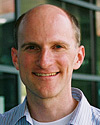
Markus W. Covert, Ph.D.
Stanford University
Project Title: A Gene-Complete Computational Model of Yeast
Grant ID: DP1-OD006413
Markus W. Covert, Ph.D., is an assistant professor of bioengineering at Stanford University. He received a Ph.D. in bioengineering and bioinformatics from the University of California, San Diego, in 2003. Covert focuses on building computational models of complex biological networks and using these models to guide an experimental program and accelerate the discovery process. He is applying his Pioneer Award to building a whole-cell computer model of the budding yeast Saccharomyces cerevisae that takes every gene into account. Covert will use the model in a detailed, systemwide analysis of why dietary restriction can have such a strong impact on lifespan in organisms ranging from yeast to mammals.
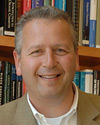
Joseph M. DeSimone, Ph.D.
University of North Carolina at Chapel Hill/North Carolina State University
Project Title: Delivery of Biological Therapeutics: Using Engineered Particles and Novel Deliver
Grant ID: DP1-OD006432
Joseph M. DeSimone, Ph.D., is the Chancellor’s Eminent Professor of Chemistry at the University of North Carolina at Chapel Hill and the William R. Kenan, Jr. Distinguished Professor of Chemical Engineering at North Carolina State University. He received a Ph.D. in polymer chemistry from Virginia Tech in 1990. DeSimone’s research in polymer science has covered a broad range of fields, including green manufacturing, medical devices, and nanomedicine. He is using the Pioneer Award to develop new approaches for delivering promising biological therapeutics to specific sites in the body via inhalation and minimally invasive ionotophoretic devices, which use local electrical currents to move drugs into tissues. Underlying his approach is a novel technology for making specifically shaped biological particles based on processes adapted from the semiconductor industry.
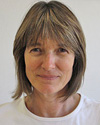
Sylvia M. Evans, Ph.D.
University of California, San Diego
Project Title: Approaches to Cardiac Regeneration
Grant ID: DP1-OD006428
Sylvia M. Evans, Ph.D., is a professor in the Skaggs School of Pharmacy and Pharmaceutical Sciences and the Department of Medicine at the University of California, San Diego. She received a Ph.D. in biochemistry from the University of British Columbia in 1984. Evans is a developmental biologist who studies the development of different types of heart cells using the mouse and human embryonic stem cells as model systems. She is using her Pioneer Award to develop new approaches to heart regeneration following injury, with a goal of finding improved approaches for treating heart failure.
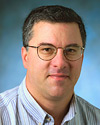
Joseph R. Fetcho, Ph.D.
Cornell University
Project Title: Global Changes in Synaptic Strength and Excitability During Sleep and Wakefulness
Grant ID: DP1-OD006411
Joseph R. Fetcho, Ph.D., is a professor of neurobiology and behavior at Cornell University. He received a Ph.D. in biological sciences from the University of Michigan in 1985. Fetcho is a neurobiologist whose work has focused on revealing principles that underlie how neuronal networks are organized to produce movements. He is using the Pioneer Award to apply optical methods in living animals to study broad-scale changes in synaptic strength and neuronal excitability that might occur during sleep, which could enhance understanding of sleep’s role in proper brain function.
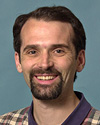
Timothy E. Holy, Ph.D.
Washington University School of Medicine
Project Title: Watching Action Potentials in Intact Neuronal Circuits
Grant ID: DP1-OD006437
Timothy E. Holy, Ph.D., is an associate professor of neurobiology at Washington University School of Medicine in St. Louis. He received a Ph.D. in physics from Princeton University in 1997. Holy develops new techniques for studying the nervous system and applies them to learn about neural processing and plasticity associated with the sense of smell. He is using the Pioneer Award to develop new optical imaging techniques to record the moment-by-moment activity of large numbers of neurons for hours at a time. These methods will allow neuroscientists to literally watch neuronal circuits compute, potentially changing our understanding of how the brain performs its functions.

Tannishtha Reya, Ph.D.
Duke University
Project Title: Imaging Self-Renewal and Transformation in Hematopoietic Stem Cells
Grant ID: DP1-OD006430
Tannishtha Reya, Ph.D., is an associate professor of pharmacology and cancer biology at Duke University. She received a Ph.D. in immunology from the University of Pennsylvania in 1996. Her work has provided insight into the signals that control stem cell growth and how these signals are subverted to fuel cancer growth. She is using her Pioneer Award to develop high-resolution imaging strategies to visualize the behavior of living stem cells during growth, regeneration, and cancer formation. A better understanding of stem cells in the context of their native environment will help develop new approaches to regenerative medicine and cancer therapy.
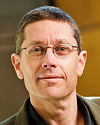
Gene E. Robinson, Ph.D.
University of Illinois at Urbana-Champaign
Project Title: Johnny Bee Good: Bees as Models to Study the Hijacking of the Reward System
Grant ID: DP1-OD006416
Gene E. Robinson,Ph.D., holds the Swanlund Chair at the University of Illinois at Urbana-Champaign and is director of the neuroscience program and theme leader at the university’s Institute for Genomic Biology. He received a Ph.D. in entomology from Cornell University in 1986. Robinson studies the mechanisms and evolution of social behavior using an integrative approach that draws perspectives and techniques from evolutionary biology, behavior, neuroscience, molecular biology, and genomics. He is using his Pioneer Award to understand in molecular terms how to transform the brain’s reward system from a selfish to an altruistic orientation. The goal is to achieve new insights into the flexibility of reward circuits that will fundamentally change our understanding of drug addiction and other diseases of the reward system.

Susan M. Rosenberg, Ph.D.
Baylor College of Medicine
Project Title: Forward Genomics of Damage Control: An Undiscovered Class of Cancer Genes
Grant ID: DP1-OD006429
Susan M. Rosenberg, Ph.D., is the Cullen Endowed Professor of Molecular Genetics in the Department of Molecular and Human Genetics at Baylor College of Medicine. She received a Ph.D. in molecular biology from the University of Oregon in 1986. Rosenberg uses molecular genetic approaches to study mechanisms of genomic instability in the simple model organism Escherichia coli. She is using her Pioneer Award to develop innovative gene discovery methods to examine how the DNA in living cells becomes damaged, leading to genomic instability and cancer. She will seek to discover genetic networks that control levels of endogenous DNA damage in E. coli and underlie genomic instability, then translate the discoveries to human cells, where similar networks may play a previously unrecognized role in cancer.

Leona D. Samson, Ph.D.
Massachusetts Institute of Technology
Project Title: Developing Novel Methods to Measure DNA Repair Capacity in Human Populations
Grant ID: DP1-OD006422
Leona D. Samson, Ph.D., is a professor of biological engineering and director of the Center for Environmental Health Sciences at the Massachusetts Institute of Technology. She received a Ph.D. in molecular biology from the Imperial Cancer Research Fund and London University in 1978. Samson applies biochemistry, genetics, and systems biology approaches to understanding the pathways that protect against DNA-damaging agents. She is using her Pioneer Award to develop novel, high-throughput approaches to measure the ability of cells from different people to resist the toxic effects of a wide variety of DNA-damaging agents present in the environment and currently in clinical use. Differences in how people respond to such agents could help explain why some develop cancer or neurological disease and others do not, why some age faster than others, and why some have better results from cancer therapy.
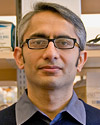
Nirao M. Shah, M.D., Ph.D.
University of California, San Francisco
Project Title: Dissecting the Neural Control of Social Attachment
Grant ID: DP1-OD006425
Nirao M. Shah, M.D., Ph.D., is an assistant professor of anatomy at the University of California, San Francisco. He received an M.D. from the University of Mumbai, India, in 1991 and a Ph.D. in biology from the California Institute of Technology in 1997. Shah is a neuroscientist who is using his Pioneer Award to develop genetic tools to understand how the brain controls an organism’s ability to form long-lasting social attachments. He seeks to provide new insight into the regulation of social ties and the profound inability to form interpersonal bonds in disorders like autism.
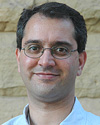
Krishna V. Shenoy, Ph.D.
Stanford University
Project Title: Toward an Animal Model of Freely Moving Human
Grant ID: DP1-OD006409
Krishna V. Shenoy, Ph.D., is an associate professor of electrical engineering and bioengineering at Stanford University. He received a Ph.D. in electrical engineering from the Massachusetts Institute of Technology in 1995. Shenoy combines theoretical, computational, behavioral, and electrophysiological techniques to determine how neural circuits generate arm movements and uses this knowledge to design neurally controlled prosthetic systems for profoundly paralyzed patients. He is using his Pioneer Award to create the technology needed to record—and perturb—neural activity and record muscle and body movements in freely moving nonhuman primates. He will use a fully wireless system to study how the brain orchestrates a broad range of movements, which could lead to new ways to treat paralysis in people.

Sarah A. Tishkoff, Ph.D.
University of Pennsylvania
Project Title: African Odyssey: An Integrative Genomics Analysis of Complex Physiologic Traits
Grant ID: DP1-OD006445
Sarah A. Tishkoff, Ph.D., is PIK (Penn Integrates Knowledge) Professor and the David and Lyn Silfen University Associate Professor of Genetics and Biology at the University of Pennsylvania. She received a Ph.D. in genetics from Yale University in 1996. Tishkoff is a human evolutionary geneticist who uses integrative methods to investigate human genomic variation and its influence on traits of clinical and evolutionary interest. She is using her Pioneer Award to develop a systems biology approach to explore the interactive effects of genomic variation, gene expression, metabolism, and the environment on normal variable traits in ethnically diverse African populations. This work will produce fundamental insights into the genetic, epigenetic, and environmental factors influencing complex traits that play a role in health and disease and will expand our understanding of human evolutionary history.

Alexander J. Travis, V.M.D., Ph.D.
Cornell University College of Veterinary Medicine
Project Title: Nanoscale Energy Production for Implantable Medical Devices
Grant ID: DP1-OD006431
Alexander J. Travis, V.M.D., Ph.D., is an associate professor of reproductive biology at the Cornell University College of Veterinary Medicine. He received a V.M.D. and a Ph.D. in cell and molecular biology from the University of Pennsylvania in 1995 and 1999. His research investigates the design and function of mammalian sperm, particularly the organization of their energy-producing pathways. With his Pioneer Award, Travis is harnessing this design to develop very small energy sources for implantable medical devices that could carry out a variety of diagnostic and therapeutic functions.
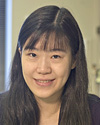
Jin Zhang, Ph.D.
Johns Hopkins University School of Medicine
Project Title: Creating a Genetically Encodable Nano-Compass to Navigate in Molecular Networks
Grant ID: DP1-OD006419
Jin Zhang, Ph.D., is an associate professor of pharmacology and molecular sciences, neuroscience, and oncology at the Johns Hopkins University School of Medicine. She received a Ph.D. in chemistry from the University of Chicago in 2000. Zhang’s research focuses on achieving a more comprehensive understanding of cell signaling by adding time and space dimensions and dynamic information to the current map of signal transduction networks. She is using her Pioneer Award to develop a new strategy for manipulating molecular force and perturbing biochemical activity in living systems via genetically engineered probes. The goal is to enable new biochemistry and biophysics studies to address many questions about the properties and behaviors of biological molecules in their native context.


